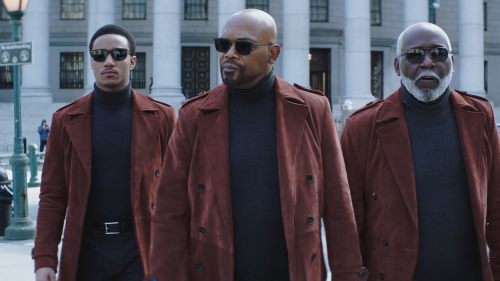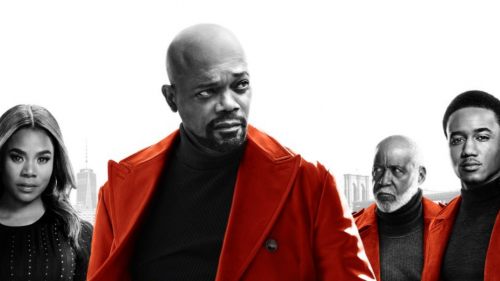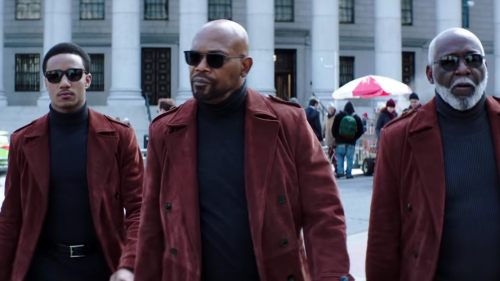Protect And Serve: The Detectives Of Blaxploitation
In honor of The Nice Guys (which you can buy tickets for here), we're kicking off a month of weekly spotlight articles celebrating Shane Black and the subgenres visited by his latest film.
Trouble Man’s Mr. T asks Police Captain Joe Marx, with tongue in cheek, “If you can’t trust the police, who can you trust?” Marx doesn’t have an answer for Mr. T, but a series of 1970s films about black detectives did. These heroes of blaxploitation have an intimate connection with their own community that white law enforcement doesn’t. They recognize that justice is rare, that it has to be fought for, and they understand just how to fight for it. Whether these crimefighters work on behalf of the government or exist at the edge of the law, they dedicate themselves to their community, challenging the establishment and doing what’s right.
Blaxploitation announced itself with the 1971 release of Melvin Van Peebles’s Sweet Sweetback’s Baadasssss Song, a film about a black prostitute on the run after he shoots two racist white cops. Sweet Sweetback and the movies that followed catered to a demographic that had previously been ignored, and the film’s insane grosses — $15 million compared to its $150,000 budget — came from an almost exclusively black audience. These films provided an outlet for black directors, writers, actors, and frequently featuring soundtracks by legends like Isaac Hayes, Marvin Gaye, and J.J. Johnson. But film critic Clayton Riley believed that “the new black films portrayed a fairy tale treatment of black life,” and the NAACP, National Urban League, and Southern Christian Leadership formed a Coalition Against Blaxploitation. Founder of this coalition Junius Griffin felt that blaxploitation was “just another form of cultural genocide.”
Actor and former professional football player Fred “The Hammer” Williamson countered, “Black exploitation movies. I have no idea who was being exploited. It wasn’t the black actors or the black audiences. They were happy they were seeing heroes on the screen. I grew up in a society where there were no black heroes.” Some felt that blaxploitation reinforced stereotypes of pushers and pimps, but many of these films subverted those stereotypes, exposing the ways that racism and a white-run drug trade were responsible for creating crime and disharmony in the black community. And for the first time, audiences could see complex black characters instead of caricatures.
Gordon Parks’s Shaft gave us the most popular blaxploitation detective, P.I. John Shaft (Richard Roundtree). Shaft joins forces with the head of a black militant organization against the white mob who’ve kidnapped the daughter of Bumpy Jonas (Moses Gunn), leader of the black mob. The only non-racist cop on the force helps Shaft, but Shaft has no problem challenging the police. He doesn’t approve of Bumpy either, but Shaft knows his daughter is an innocent and Bumpy can’t go to the cops. Shaft’s role as intermediary between these worlds is essential.
Ivan Dixon’s Trouble Man has not endured in the way that Shaft has — Harry Medved and Randy Dreyfuss even included Trouble Man in their 1978 book Fifty Worst Films of All Time, but the film represents the best of blaxploitation. The mysterious private eye Mr. T (Robert Hooks) is a one-man army. He’s as cool as Shaft, and maybe more dangerous. Mr. T is set up as a fall guy, framed for murder by a black crime boss and a white police force, but the mastermind of the whole scheme is a racist white criminal. It’s up to Mr. T to bring him down. And while Mr. T must deal with problems of his own, he’s a fixer for his community: a rotting staircase crumbles in an old apartment building, causing a mother to fall, injuring her baby. But Mr. T convinces the building’s white landlord to repair it, to pay for the baby’s medical bills, to apologize to the mother personally. He even recognizes problems before they’re articulated: one man drops a half-smoked cigarette during one of Mr. T’s billiards games, then fumbles for another, and Mr. T snaps his fingers. The man approaches to explain, “I got trouble, Mr. T” — but Mr. T already knew.
The blaxploitation crimefighter takes on white corruption whether he finds it in the criminal world or in law enforcement, but the moral view of Arthur Marks’s Detroit 9000 is hazier — black and white men pull off a heist together at the film’s beginning, in what one cop calls a “very integrationist operation.” Detroit 9000’s protagonists are Sergeant Jesse Williams (Hari Rhodes) and Lieutenant Danny Bassett (Alex Rocco), a black cop and a white cop respectively. Williams reflects on Bassett’s feeling that the heist had nothing to do with race: “He’s the only one that saw it the way it was, man — just another rip-off. It’s like he said. ‘Assholes are only assholes.’” But Bassett’s ethics are called into question by the film’s end, and only Williams remains righteous.
Blaxploitation also brought us crimefighting women, both law enforcement figures and vigilantes, usually played by Pam Grier, Tamara Dobson, or Teresa Graves. They challenged the one-dimensional women featured in male-starring films like Shaft and Cotton Comes to Harlem. They were sometimes inspired by white male heroes — like Dirty Harry, Pam Grier’s Sheba Shayne has a .44 Magnum and drives a Ford Mustang. At the time there was no white female equivalent to these action heroines, and they paved the way for Alien’s Ellen Ripley and The Terminator’s Sarah Connor. But these crimefighting women had more realistic concerns than aliens and cyborgs: they protected their cities and avenged their loved ones, and they helped redefine what it meant to be a woman. Grier remembers, “At the time, some people were horrified because they felt I was posturing as a man. [ . . . ] I was strong with firearms but proved I could also be feminine.”
Cleopatra Jones (Tamara Dobson) is like James Bond, a well-dressed super spy and martial arts expert with a '73 custom Corvette Stingray. She keeps a MAC-11, grenades, and a Colt Diamondback in a special compartment inside the Corvette’s door, and they come in handy. Jack Starrett’s film opens with Cleopatra blowing up a Turkish poppy field valued at $30 million on the street, and it belongs to her nemesis Mommy, a white lesbian drug kingpin played by Shelley Winters at her most Shelley Winters. Mommy retaliates by arranging a police raid at a halfway home run by Cleopatra’s boyfriend, shutting the home down when a cop plants dope on a recovering addict. Cleopatra returns to Los Angeles to stop Mommy, her henchmen, and the racist cops on her payroll.
Cleopatra Jones is set in an idyllic world where Cleopatra’s male peers admire her and even defer to her. When Cleopatra needs to find a witness, police captain Lou Crawford (and the only uncorrupt white cop) offers to join her, but Cleopatra says she can handle it, and he acquiesces. As she leaves, Lou asks another male cop whether he ever has “feelings of inadequacy.” And when Cleopatra has to leave town for another mission, her boyfriend asks, “how long this time, baby?” and Cleopatra answers, “Until it’s finished,” then drives off in her Corvette alone. A film like Cleopatra Jones would feel radical even today.
The term “blaxploitation” is better understood as a production cycle than a genre since movies falling under this umbrella ranged from comedies to martial arts to horror and more. One of the most popular and well-represented genres in blaxploitation was the detective film, and these stories blended pulp with the western, the sense of a gunslinger protecting the weak against the powerful. Edgar Allan Poe established the detective genre with his story The Man of the Crowd, but the blaxploitation detective was a man with the crowd. From C. Auguste Dupin to Philip Marlowe, the detective was often a roving eyeball, an outsider, but blaxploitation crimefighters stood with their community as they protected it.
The detectives of blaxploitation recognize that the police are ineffective, compromised by corruption and racism, and that it takes an insider to look after their cities’ people, to solve their mysteries, to punish crimes against them, to defend them. The black crimefighting heroes of the 1970s face the issues of their time — and ours — with hope and grit, and they offer the fantasy of justice. When Mr. T is asked, “Confusing fuckin’ world, ain’t it, man?” he answers, “Yeah, but I’m gonna get it all straight,” and these heroes fulfill Mr. T’s promise.



